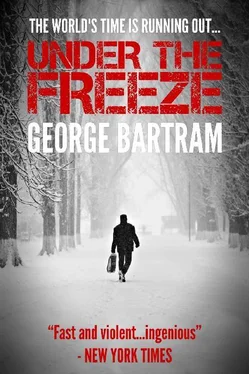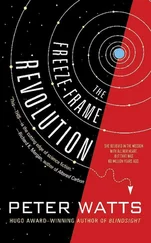He had brought the stainless-steel bottle of gasoline from the boat and he poured gas into the little motor’s fist-sized tank. The motor was a noisy workhorse that would push the inflatable all the way to Florida if he would let it. And if I had the gas .
He started the engine and headed slowly up the coast. His watch told him it was half an hour since Repin had boarded the patrol boat. Eleven minutes later, there was a roar of fire behind him, and any doubt he had had about what the scuba diver had been doing was removed. The light trickled down over the water toward him like an oil slick as red fire went up like a ball, turned orange, then gold, and then sank quickly to a low glare of yellow. Gasoline was burning on the surface where the boat had been, but the boat was gone.
He went slowly westward, steering by the lights of the coast and the stars that showed through muggy haze. There was no use trying to get out into the Gulf. If the Cubans didn’t get him, the Coast Guard would.
He turned in toward the Cuban mainland, and, a quarter of a mile out, cut the engine and went over the side, slashing the inflatable and letting it sink on the engine’s weight before he struck out for shore.
Moscow here I come , he thought wryly.
He lay on a sandy ridge twenty yards above the coarse grass that marked the edge of the beach, with broken butts of palm fronds around him like big celery stalks. Behind him were small pines, on which he had draped his clothes to dry. Now, in the daylight, he gathered the clothes and brought them down to the place among the palms so they would not be seen.
He cut the American labels from the clothes. He wanted Cuban identification and Cuban money, and for that he would have to find Repin. Moving around was going to be dangerous, because Cuba was a country as localized and as organized as a medieval manor; any stranger would be reported. Every city block, every rural crossroads, had its Committee for the Defense of the Revolution, which functioned as neighborhood council and intelligence center and which could put together anything from a party to a purge.
He was hungry. Today he could ignore hunger. Tomorrow would be different. He would have to get to Havana and make contact with Repin quickly. How long before Repin returned to Moscow? he wondered. More to the point, how long before the DGI put the military and the militia on him? Or would they know that the boat had blown up and believe that both he and their men were gone?
A helicopter came over at ten o’clock. Tarp, wearing only the dark-blue briefs that looked like swimming trunks, walked boldly to the water’s edge and stood there, hands on hips, staring at the water. When the chopper passed over, he waved.
A few minutes later, he heard voices. He knelt by his clothes with one hand under them, holding the .22. They came closer, and he could tell that one was a woman’s. Then words — English words — became understandable. “Definitely not what I… Incredible! Night after… Betrayal… take me for, anyway?”
The word serious was used several times.
A male voice said, “Yeah.” In very American English. Tarp kept his head down. They passed on his left, going toward the beach.
“I’m really, I mean I’m really disappointed. I mean, I’m disappointed .”
“Yeah.”
“Don’t you think?”
“They’re not serious .”
“It’s really disappointing.”
He peered through the palms and saw a young man and woman. She had very pale hair that looked almost white in the sunlight, but her skin was burned pink. She was wearing a dress that looked like a piece of Edwardian underwear, white, frilly, eyeletted, with a very full skirt. She was carrying her shoes in her left hand and just then she was digging the toes of one foot into the sand like a pouting child. The boy with her might almost have been a clone of the younger Agency man, for he had the same look of rather brutish innocence, that amoral California quality of brainless muscle. He wore shorts and a bright-yellow T-shirt with a decoration on the front.
“Nightclubs,” Tarp could hear the girl saying. “Goddamn nightclubs just make me barf. Don’t they, Rick?”
“They’re sickening.”
“And all this booze? I don’t think they’re serious about the freeze. Do you?”
“I think they’ve been corrupted.”
“Bourgeois.”
“Yeah.”
Tarp wriggled into his trousers and slid the .22 under the shirt, which he left lying under the palm stumps.
“Do you think they’ve betrayed the revolution?” the girl was saying.
“Don’t talk so loud.”
“Well, do you?”
Tarp stood up. Even barefoot, he towered over them, the low, sandy ridge giving him more height. The girl saw him first and her mouth opened in a perfect circle. It was small and soft and pink, like a baby’s, and it stayed opened, looking astonished.
“Comrades,” Tarp said. He walked down the sand hill toward them. “Comrades both!” He tried a Russian accent and it came out like Repin’s voice.
“Comrade?” The girl had taken the boy’s hand and they both looked terrified of him.
“Comrades,” Tarp said again. His mind was jumping ahead: here he had two people who would not question his identification and who had no Committee for the Defense of the Revolution to which to report. “Comrades, I am not being able to help overhearing what you are saying next to me while I am enjoying the Cuban sunshine on my visitation to this lovely island.” He smiled. His smile was never very jolly, and it sometimes was worse than his frown. It had the effect of moving the girl closer to the young man, and her mouth opened a little wider. She had no makeup on, except around her eyes, and she looked about fifteen. “You are Americans?”
“We’re here for the freeze,” the young man said. “The International Friends of the Nuclear Freeze Movement.”
“Ah. Yes?” Repin had said something about the freeze movement as a reason for the ballet troupe’s being there. “Ah. I, too.”
“You’re here for the freeze day?” the girl said with what seemed to be suspicion. It might simply have been disinterest.
“Ah, in a manner of talking. Yes. You have transport, have you, back to Havana?”
“The bus, yeah,” the boy said. The girl frowned up at him. “Don’t you have transportation?” she said. Now she sounded quite suspicious. Perhaps she had a CDR block group, after all.
“Of course!” A bus . What kind of bus would they take back to Havana? And how was he going to get on it without any money? “You took bus all the way out here from Havana, my friends?”
“It’s a tour,” the boy said.
“Everything’s a tour,” the girl added.
Tours meant tour guides; tour guides meant intelligence agents, or reports, at the very least. He began to regret speaking to them. “Well, I have to go, Comrades,” he said. “I have an appointment.” As he turned away, the boy said quickly, too loudly, “We weren’t complaining, you know!”
“Oh, Rick!” the girl muttered.
Tarp turned back. “You are worried about what I will say I heard, my friend?”
“No, no. I just wanted to be straight with you. You know. We were just having a private, uh, conversation. About all the great things they’ve done for us. It’s a great tour. Really.”
“Oh, Rick!” the girl said. Her voice was nasal. She faced Tarp, pink with defiance. “Actually, we were bitching a lot!” she said. “You heard us, right? So why pretend? We’ve never been to Cuba before, we wanted to see how the revolution works, and they keep taking us to nightclubs , and they keep giving us booze , and they keep showing us apartment houses, and… We just came to demonstrate for world peace, you know?”
Читать дальше












